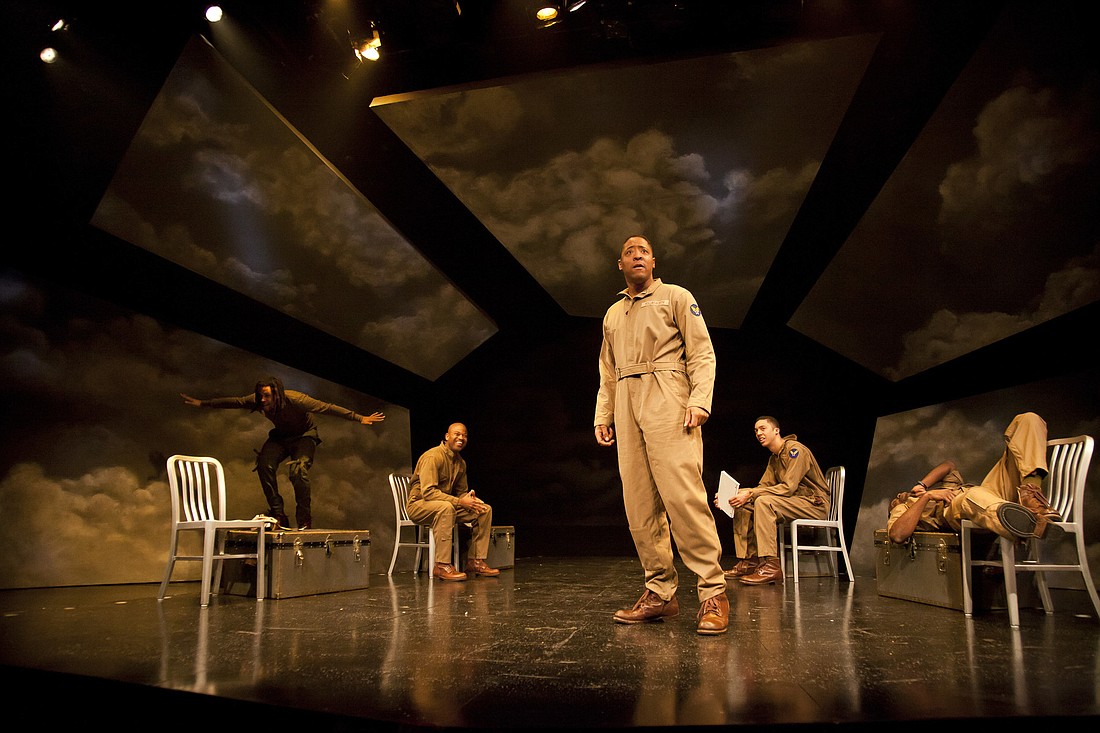- November 24, 2024
-
-
Loading

Loading

Officially, they were the 332nd Fighter Group. Today, the world knows them as The Tuskegee Airmen — a group of African-American combat pilots who fought with distinction in World War II. They flew P-51 Mustangs (with distinctive red tailfins) as fighter escorts for lumbering B-25s on strategic bombing raids deep into enemy territory. They went up against Messerschmitt Me 262s — the world’s first jet fighters.
Notions of white Aryan superiority to the contrary, these black aviators came out on the winning side. These heroes paved the way for the integration of the United States military and, arguably, the nation itself. Ricardo Khan and Terry Ellis’ “Fly” tells their story at Florida Studio Theatre in a production Khan also directed.
Untold books have explored this history. It’s been visualized in high-profile movies such as “Redtails” (with its “Star Wars”-esque dogfights) and the “Tuskegee Airmen” (which Ellis co-wrote) on HBO. Yes, their story has been told before. But never like this.
A film can give you believable illusion, courtesy CGI or a grip rocking a replica of a P-51 on gimbals. Khan and Ellis’ play doesn’t try to compete with cinema. No “Miss Saigon”-style aircraft appear. The actors mime the action with minimal staging — just chairs, trunks and rear projection screens (brilliant work by scenic designer Beowulf Boritt, projectionist Rocco DiSanti and the rest of the creative team). Yes, there’s audio and some CO2 fog. But the real action is in your mind. Your imagination builds the world. It’s make-believe — and it works, with the power that only live theater can have.
The story told is as ancient as “The Iliad” and raw as “Generation Kill.” Basically, a group from disparate backgrounds comes together as a unit and goes off to war. Some die, some don’t. That’s no cliché. It’s what war is.
The difference here: These warriors were fighting on two fronts. Fascism over there; racism here. Their homefront enemy? Official studies that said, “Negroes lack the intelligence to operate heavy machinery.” Unofficial racist attitudes in the minds of white officers who spoke their minds in a constant barrage of racial slurs.
Along with helping bring down the Nazi war machine, the Tuskegee Airmen defied white expectations of black failure and earned the respect of their fellow aviators. To get to the Nazis, they first had to get through flight training school in Tuskegee, Ala.
Four composite characters stand for the 996 original pilots in training: Chet (Jordan Bellow), a 17-year-old recruit passing for 18; W.W. (Robert Karma Robinson) a refugee from Chicago’s jive-talking, zoot-suit scene; Oscar (Terrell Wheeler) a country boy from Iowa; and J. Allen (Shane Taylor) from the West Indies.
Excellent aviators all; the hard-as-nails white flight instructor (Greg Brostrom) scrubs two of them on flimsy pretexts. The Tap Griot (Omar Edwards) expresses the black aviators’ repressed emotions through dance — improvised riffs off Hope Clarke’s crisp choreography. Edwards’ machine gun fire with its staccato beats speaks volumes. Chet and W.W. finally show what they’re made of in the flak-filled skies over Germany.
Michael Pauley and Sean Patrick Hopkins play two bomber pilots whose bigoted attitudes take a 180-degree turn in the presence of fearless excellence.
The excellent performers did justice to the real-life warriors. Khan approaches these characters as individuals, not archetypes. W.W., Oscar, J. Allen and Chet are flesh-and-blood people, not walking editorial cartoons. You know they’re heroes without superpowers — heroes who bleed and don’t always win. That’s why you care.
“Fly” takes you on a hero’s journey — a fast-paced, 90-minute flight without a wasted moment. The airmen’s victories against racism are stirring but not the whole story. The multimedia experience viscerally captures the feeling of flight — both the exhilaration of soaring above the world and the knowledge that death (through enemy fire or your own screw-up) is always only seconds away.
The play makes you feel it.
Thanks to a few projection screens, audio effects and some trunks and chairs and the power of imagination, you’re right up there with them. Uplifting, to say the least.
Don’t expect to come down for a while.
IF YOU GO
“Fly” runs through April 4, at Florida Studio Theatre’s Gompertz Theatre, 1247 First St., Sarasota. Call 366-9000 or visit floridastudiotheatre.org for more information.